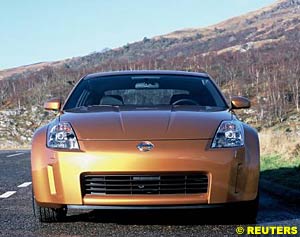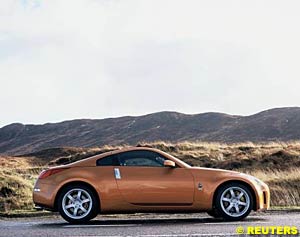

Automotive News and Reviews for the Petrolhead
Reuters Motoring Commentator
In this week's issue:
- Z Cars Return
- The War Against Road Deaths
- Cheapers Cars, Eventually
Who in their right mind would want to buy a sports car with a Nissan badge? Turn the clock back thirty years and the answer was: just about everyone.
Back in the early 1970s Nissan - or Datsun as it then was - was peddling its very own Z cars. The 240Z and 260Z were seminal sports coupes designed by a German aristocrat, Count Albrecht Goertz. With lithe looks, raw sports character and peerless Japanese reliability, these were the sports cars the world couldn't stop itself from buying. Indeed the 240Z/260Z remains the best-selling sports car in history, with over 700,000 made in all.
Where does Nissan fit into all of this? It has gone back to basics and built a car that's a genuine sports car. Which is fantastic news because just about everyone else is taking the opposite approach and building GT cars with more refinement, more toys and less fun.
Fun on the Menu
Fun is certainly high up on the menu. For starters, you have a good old-fashioned front-mounted V6 engine driving the rear wheels - none of that fancy four-wheel drive quattro stuff, thank you Audi. And the 350Z is all the better for it. It has handling balance and adjustability in a way that you thought you'd forgotten. If you're a TT driver and you want to know what real handling is all about, drive a 350Z. It's incredibly grippy (in the dry at least) yet doles up old-fashioned feedback just the way you want it. Part of the balance comes from a very wide-track chassis - something you immediately notice when you step out of the car and are faced with leaping a sill the size of a Forth Bridge girder. If it's been raining, guaranteed you will get a soggy calf.
Another component of the handling balance comes from the engine being mounted so far back in the chassis so that it benefits from a near-perfect 53/47 front/rear weight distribution. As to the V6 in question, it's a 3.5-litre power plant with no less than 280bhp on tap, more than any other rival. And guess what? It sounds like a sports car. That's another trend the 350Z bucks: sports coupes have been heading in the direction of full-scale cocoons, insulating you from every sound and ruffle. Pure folly. When an engine sounds as good as this, you want to hear every decibel. Only Alfa Romeo makes engines which sound meatier, throatier and classier than this.
Back-To-Basics Sports Car
Brembo brakes - ostentatiously painted gold behind the alloy wheels - are also sporting-sharp. But you couldn't call the 350Z ostentatious in other areas. Its subtle lines are rather understated, if anything. The only showy item is the cross-brace that runs right across the rear luggage bay, with a chrome 'mark of Zorro' Z shining through the rear window.
Retro-Modern Style
As for the rest of the cabin, Nissan has done a great retro-modern job. A triple-gauge dash mounted on the steering column houses a giant rev counter in the middle. Mirroring this are three minor dash top gauges, rather like the original Z of the 1970s.
The standard 350Z at £24,000 looks excellent value and it offers more power per pound than any other rival. Only the Mazda RX-8 looks better value but it doesn't have as much power or as much raw excitement. For an extra £2500 a GT pack adds cruise control, heated leather seats and a Bose hi-fi.
Short of a Lotus Elise, the 350Z is the sportiest drive you are going to get for £24,000. Because it is also a comfortable companion that will carry two sets of golf clubs under its tailgate, you can even pretend it's actually a sensible choice. Sensible? I defy you to hide an ear-wide grin when you're flooring the loud pedal.
Written by Chris Rees
Cutting road deaths deserves the same attention as fighting terrorism, Max Mosley, the president of the International Automobile Federation, said.
Mosley, who heads two road safety bodies as well as motorsport's governing body, said 1.26 million people had died on the roads worldwide in 2000, dwarfing the number killed by terrorism.
"If you compare that to the victims of terrorism, and you think of the energy, time and publicity that goes into dealing with terrorism... it is extraordinary that road safety does not attract more interest, especially on a world scale."
Mosley, chairman of public-private road safety group ERTICO, was speaking at a European Union news conference on technologies to prevent vehicle accidents. He cited a new generation of antilock braking, electronic stability control, which should only cost 100 to 200 euros to fit. Research had shown that electronic stability control could cut road deaths significantly by stopping cars going into a spin, Mosley said.
However, European Commissioner Erkki Liikanen said standard antilock brakes were still only present in two thirds of cars on European Union roads, despite being developed in the 1970s.
He added that the EU could speed the adoption of new technologies by promoting common standards, for example for in-car radar systems which could be used to alert drivers to pedestrians or cars overtaking dangerously. But tightening EU vehicle safety rules to make new safety kit compulsory was only an option once the equipment was proven and in use in the majority of cars, Liikanen said.
The vision is a car buyer's paradise: cheap autos from Cadiz to Copenhagen, supermarkets selling Ferraris alongside Fords and bargain repair shops close to home.
New rules to boost competition in the European Union's car sales network by loosening manufacturers' grip on dealers take effect on October 1, and consumers can already see some changes.
In France, Michel Leclerc, the brother of the man behind Leclerc hypermarkets, has set up Automobil-Eclerc, a network that sells 200 different models from different brands at a 12 to 30 percent discount to old-style dealership prices.
"It's a supermarket in the sense that you can walk in, look at 200 or so cars, choose one at a discounted price and drive off in it," says Michel Leclerc.
The new EU rules allow Leclerc to buy the cars more cheaply via brokers in Belgium so he can cut prices at home.
And he is not alone in embracing the fresh possibilities. New outlets and car supermarkets are springing up across Europe. German retailer KarstadtQuelle's mail-order division is offering a 10 percent discount on Internet orders for Volkswagen's new Golf.
In Belgium, shoppers at discount supermarket chain Colruyt can pick up promotions with discounts of up to 5,000 euros, and vouchers for no VAT on cars bought at Antwerp-based discount car retailer Cardoen. It sounds too good to be true.
Pipedream
In fact, it probably is -- at least in the short term. The reality could lead to the emergence of a small number of mega dealers who control pricing as much as the manufacturers do now. Supermarkets, still allowed only to resell cars, may back off when they realise how little they are earning as it is after-sales service that accounts for most of a dealer's profit.
And drivers, many of whom consider buying a car an emotional experience, will often want to drive the automobile and talk to an experienced salesman before splashing out. But most of all, prices will not fall across all of Europe.
"The impact on the consumer will not be visible in the short term and expectations of falling prices is a fantasy," said Wolfgang Brueckner, a director at Urban Science consultancy.
Before the new rules were announced last year, pre-tax prices for the same models varied up to 50 percent between countries within the so-called single market, and national tax levels remain a major obstacle to standard prices.
A Reuters survey proves the point. Peugeot's popular small 206 has a list price of 9,290 euros in Greece but 18,842 euros in Denmark. Ford's larger Mondeo goes for 36,349 euros in Denmark but costs just 19,150 euros in France.
Several factors, including the euro, which has improved transparency, will gradually lead to price convergence, but the trend may not be down. Most experts expect the highest prices to slip slightly but in many countries they will go up.
Morgan Stanley says UK prices have fallen 15 percent in the last three years but German prices remain stubbornly high, about five percent above the continental European average.
Carmakers Fret
Despite such buoyant prices, Europe's "national champion" car makers in particular fear ceding more ground to Asian rivals as they lose their grip on their home markets' distribution networks. Few European carmakers will see profit growth this year as they battle falling demand, overcapacity and fierce competition.
Manufacturers may also be worried about brand erosion as some dealers may sell several marques under one roof. Companies invest heavily in developing and guarding car brands as they are the most powerful pricing levers they have.
"There is a danger that cars will be sold through channels the manufacturers don't want and they could lose control of the customer," said Brueckner, who thinks the danger is greatest for Ford, Opel and VW, whose models are less distinctive than those of their rivals.
Another worry for automakers is the loss of earnings from spare parts which can account for 20 to 30 percent of profits. On top of that, spending on distribution, which can comprise 30 percent of a maker's total costs, may rise with greater marketing and logistics requirements, experts say.
But the impact on dealers may not be all positive either.
While the new rules offer an opportunity to expand, some larger players, including Inchcape and Reg Vardy, could grow aggressively, and experts envisage a small number of powerful dealers devouring small family-owned firms. In a taste of things to come, Inchcape, which sells nearly a fifth of the world's Maserati and Ferrari sports cars, has signalled its intentions by buying six BMW dealerships.
![]() Z Cars Return
Z Cars Return
 So the idea of Nissan taking on Audi and BMW in the sports coupe market may not be so fanciful after all. But Nissan's glory years were 30 years ago and with the new 350Z, it has got to prove itself all over again. These days the battlefield is much more competitive too. The 350Z's number one rival has to be Audi's TT, which British buyers rate above every other sports coupe. Despite being five years old, comfortably more TTs were sold last year than any other rival - well over 5000 in fact. The pace is hotting up, with Mazda reckoning to sell no less than 6000 of its aggressively priced and brilliant-to-drive RX-8s next year.
So the idea of Nissan taking on Audi and BMW in the sports coupe market may not be so fanciful after all. But Nissan's glory years were 30 years ago and with the new 350Z, it has got to prove itself all over again. These days the battlefield is much more competitive too. The 350Z's number one rival has to be Audi's TT, which British buyers rate above every other sports coupe. Despite being five years old, comfortably more TTs were sold last year than any other rival - well over 5000 in fact. The pace is hotting up, with Mazda reckoning to sell no less than 6000 of its aggressively priced and brilliant-to-drive RX-8s next year.
 Thanks to that huge dollop of power, acceleration is more convincing than just about any rival: 0-60mph takes just 5.7 seconds, aided by a close-ratio six-speed gearbox that feels chunky yet fast to use. This being a back-to-basics sports car, there is no automatic or sequential option. I loved the steering too: yes, it is power assisted but not overly so. Its heavy weighting lets you feel exactly what the front wheels are doing.
Thanks to that huge dollop of power, acceleration is more convincing than just about any rival: 0-60mph takes just 5.7 seconds, aided by a close-ratio six-speed gearbox that feels chunky yet fast to use. This being a back-to-basics sports car, there is no automatic or sequential option. I loved the steering too: yes, it is power assisted but not overly so. Its heavy weighting lets you feel exactly what the front wheels are doing.
![]() The War Against Road Deaths
The War Against Road Deaths
![]() Cheapers Cars, Eventually
Cheapers Cars, Eventually
© 1995-2005 Kaizar.Com, Inc. . This service is provided under the Atlas F1 terms and conditions.
|
Volume 9, Issue 40
Atlas F1 Exclusive
Interview with Rubens Barrichello
Ann Bradshaw: View from the Paddock
2003 US GP Review
2003 US GP Review
The Michael Schumacher Problem
American Heartbreak
Stats Center
Qualifying Differentials
SuperStats
Charts Center
Columns
Season Strokes
On the Road
Elsewhere in Racing
> Homepage |